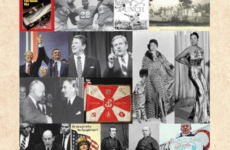By Marrissa Ballard | Staff Writer
Jay Sullivan, a lawyer who spent two years in Jamaica working with a group of orphan boys, will give a talk on Tuesday March 17th about his experiences and the book he wrote, Raising Gentle Men: Lives at the Orphanage Edge.
Sullivan spent two years in Kingston, Jamaica, where he taught at St. George’s College, an all-male Jesuit high school. He also volunteered at Alpha Boys School, an orphanage for young boys.
He first visited Alpha when he brought his students there because the Jesuit high school encouraged community service. After school, Sullivan and his students would visit the orphanage and help entertain the boys. Later in the evening, he would return to the orphanage alone and read the boys bedtime stories.
According to Sullivan, every day at Alpha was different. “It was a very dynamic place,” Sullivan said. Children and volunteers would come and go, and each day brought new challenges and crisis.
“What was constant about the place was the message of love and caring that the Sisters were providing for the boys,” Sullivan said.
Sullivan first went to Jamaica after graduating from Boston College with a degree in English. According to him, all of his friends were signing up for the volunteer program at Boston College, so he also decided to sign up as well. “I would love to say that I just felt this call to serve the poor, but that is not what happened,” Sullivan said.
Sullivan did not do much research about his service trip, or where he was going. “The first time I remember actually thinking about what I was doing and where I was going was when they closed the door of the airplane,” Sullivan said. “I felt duped by God.”
While filling out paperwork and doing interviews, Sullivan felt like he was in a “fog” where he did not really think about what he was doing. He believes this was God’s way of keeping him from “chickening out.”
At Alpha, there was a junior and a senior hall. In all, the orphanage held 250 boys, though Sullivan worked with the younger group of 96 boys. There were 8 rows of cots and 12 cots in each row for the boys to sleep on. “The place was always filled, there was never an empty cot,” Sullivan said.
Classes were taught at the orphanage in the daytime, and then after classes the boys would have free time. “You would have one makeshift soccer ball in the field, and 96 kids traveling in a hoard around it,” Sullivan described. “There was no structure to their play.”
When Sullivan and his students first started visiting Alpha, they brought board games, cards, and checker sets to create a “game room” for the boys. Every afternoon, Sullivan and his students would set up the games and 20 to 30 kids would come inside to play. This gave the boys an opportunity to work on their memory, concentration, and their number or strategy skills.
“They learned how to sit quietly at a table, learn the rules, and play by the rules,” Sullivan said. Sullivan wanted to give the boys options and variety in their free time.
After volunteering for a year, Sullivan approached the Sisters of Mercy and asked if he could stay in the convent. He spent the year living in the orphanage and continuing his volunteer work.
While volunteering at Alpha, it was not hard for Sullivan to stay positive. “For good or for bad, I came to accept the world for what it is,” Sullivan explained. “I do not go into things with rose-colored glasses.” Sullivan believes that starting from a realistic perspective allows him to see all of the joy and good in the world, instead of being overwhelmed by the tragedy in the world.
Sullivan also was not alone while working at Alpha. All of the sisters were there to spread the message of love, and one in particular was a close mentor to him. Her name was Sister Magdalen and she is a central character in his book, Raising Gentle Men: Lives at the Orphanage Edge.
Sister Magdalen, according to Sullivan, had a sense of practicality that allowed her to solve each problem that came her way. She also had a sense of humor, which helped keep things light at the orphanage. “She lived the example instead of talking the example,” Sullivan said.
When Sullivan returned to the States, he wanted to find a way to do work that was similar to what he did at Alpha. “You set up this pattern for yourself and you find what rewards you, and clearly what rewarded me was doing this work for the poor,” Sullivan explained. He began working at the Covenant House in New York City, which is a center for runaways and homeless teens. He represented homeless teens and helped them navigate through legal issues.
Sullivan also attended Fordham University, where he received a degree in law. “I looked for opportunities to keep that spirit that I had gained in Jamaica alive for me in law school,” Sullivan said. He became a part of the Fordham Student Sponsored Fellowship, which is a not-for-profit organization funded by law students. The funds raised allowed other law students to enter public service and social work jobs. The corporation is still around today, and it funds around 30 summer jobs a year.
His book, Raising Gentle Men: Lives at the Orphanage Edge, has been praised for being a more realistic portrayal of service trip. It has both sad and funny moments, but the whole book is full of human characters. “Nobody got to be a saint,” Sullivan stated.
“Everybody is just trying to do their job and serve the poor,” Sullivan said. “At the end of the day, they were all really just trying their best.”
Sullivan will spend much of his talk discussing the major themes of his book, which he stated in two questions. “First, ‘How do we figure out who we are?’ and then ‘How do we make sure that who we are is adding value to the world?’” Sullivan explained.
According to Sullivan, the most important part of figuring out who you are is to make sure that you are contributing to the world around you. After those two questions are answered, the next important thing to do is to start “building a community of people around you who can help with adding that value,” Sullivan said.
Another huge part of the book is the idea of the “Orphanage Edge.” The edge describes how even though Sullivan lived at an orphanage for two years, he could never say that he knows what it is like to be an orphan. “I could still be there 30 years later and I would not know what it is like to grow up in an orphanage,” Sullivan said. “I can only get so close to their experience.”
Similarly, the orphans at Alpha will never know what it is like to grow up within a family unit. “The boys will always live their life as someone who grew up in an orphanage,” Sullivan said.
“There is this line that we cannot cross, in terms of experiencing each other’s lives,” Sullivan stated. “But we get right to the edge; we can have a view of what their world is like.” Through the volunteers, the boys could get a glimpse at what it was like to have a family and support system, and through the boys, Sullivan could get a glimpse at what it is like to live in an orphanage.
The idea of the Orphanage Edge also relates to the public at large. “If life takes its normal course, we all outlive our parents,” Sullivan said. “And so, at some point, we all become orphans.” Sullivan believes that everyone experiences a poignant moment where they recognize that they are orphans; that they are alone without their parents.
Sullivan was inspired most by the message of love that the Sisters of Mercy exemplified. “They were a constant example of Christ’s message, which is to love others,” Sullivan said.
Sullivan had advice for those hoping to do similar work or go on service trips. “Try something small first if you have never done any kind of service trip,” Sullivan stated.
His most important piece of advice was to “Be open.” He encouraged students to ask the question: “How can I take the spirit of Christ’s message and add it to my life?”
Sullivan will be at Salve on Tuesday, March 17th, at 7 pm to talk about his experiences and his book. The talk will take place in DiStefeno Hall. He hopes to encourage the audience to start questioning who they are, and how they can add value to the world around them. His book is available on Amazon, and there will be a book sale and signing after his talk. All proceeds from the book sales go to the Jesuits and Sisters of Mercy in Jamaica.














